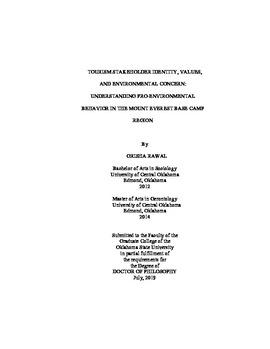| dc.contributor.advisor | Mix, Tamara | |
| dc.contributor.author | Rawal, Grisha | |
| dc.date.accessioned | 2020-01-30T15:03:15Z | |
| dc.date.available | 2020-01-30T15:03:15Z | |
| dc.date.issued | 2019-07 | |
| dc.identifier.uri | https://hdl.handle.net/11244/323373 | |
| dc.description.abstract | This research project explores the causes and consequences of the tourism economy on values, environmental concerns, and pro-environmental behaviors amongst stakeholders in the Mount Everest Base Camp (EBC) region of Nepal. Stakeholder groups were divided into five different categories: local residents, business owners, government officials, guides/ porters, and tourists to understand their interaction with the environment and impacts of their behavior on environmental inequalities in the region. | |
| dc.description.abstract | Tourism is very important for the EBC region. It is not only an economic activity but also a social institution. People gain their stakeholder identities by engaging in the tourism economy. Tourism differentiates amongst stakeholders through unequal distribution of resources. People's willingness to engage in environmental behaviors is based on power, privilege, and resources available to the stakeholders. Difference in power and privilege impacts people's exposure to environmental benefits and harms. When environmental problems impact poor and ethnic minorities, their concerns are least likely to be addressed in policies and practices. | |
| dc.description.abstract | Pro-environmental behaviors are multidimensional, with people choosing to engage in one behavior and not engage in others based on available resources or personal biases. Stakeholder groups in the EBC region engage in environmental behaviors based on their personal conception of the problems in the region and their personal biases, such as rationality (betterment of tourism economy), altruism (place attachment to the region), self-interest (personal hardships), or their job requirements. Stakeholders often engage in pro-environmental behaviors to promote tourism and facilitate the tourism economy. | |
| dc.format | application/pdf | |
| dc.language | en_US | |
| dc.rights | Copyright is held by the author who has granted the Oklahoma State University Library the non-exclusive right to share this material in its institutional repository. Contact Digital Library Services at lib-dls@okstate.edu or 405-744-9161 for the permission policy on the use, reproduction or distribution of this material. | |
| dc.title | Tourism Stakeholder Identity, Values, and Environmental Concern: Understanding Pro-Environmental Behavior in the Mount Everest Base Camp Region | |
| dc.contributor.committeeMember | Fullerton, Andrew | |
| dc.contributor.committeeMember | Whitham, Monica | |
| dc.contributor.committeeMember | Sheehan, Rebecca | |
| osu.filename | Rawal_okstate_0664D_16334.pdf | |
| osu.accesstype | Open Access | |
| dc.type.genre | Dissertation | |
| dc.type.material | Text | |
| dc.subject.keywords | environmental behavior | |
| dc.subject.keywords | environmental concern | |
| dc.subject.keywords | mount everest base camp | |
| dc.subject.keywords | stakeholder identity | |
| dc.subject.keywords | tourism | |
| dc.subject.keywords | values | |
| thesis.degree.discipline | Sociology | |
| thesis.degree.grantor | Oklahoma State University | |
